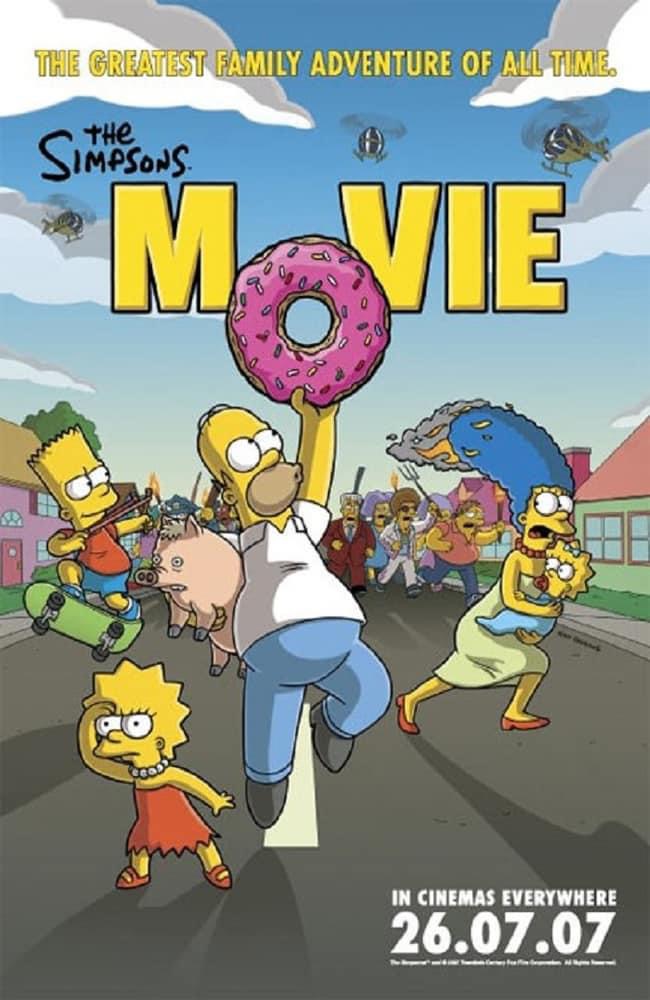The Simpsons Movie (2007)

The Simpsons Movie (2007), directed by David Silverman, is a big-screen extension of the long-running animated TV series The Simpsons. As one of the most anticipated film adaptations of a beloved TV show, the movie had the challenging task of translating the show’s irreverent humor, satirical wit, and iconic characters into a feature-length story. The result is a film that both honors the essence of The Simpsons and offers a fresh, larger-than-life adventure that remains true to the series’ spirit while delighting fans and newcomers alike
Suggested videos for you:
Plot Overview
The film centers on Homer Simpson (voiced by Dan Castellaneta) and his family as they inadvertently cause an environmental catastrophe in Springfield. After Homer adopts a pet pig, which leads to a series of disastrous events, he irresponsibly dumps toxic waste into a nearby lake, causing the government to seal off the town under a massive dome.
As the town begins to crumble, Homer must reconcile his mistakes and take responsibility for his actions. The movie becomes a story of redemption, as Homer embarks on a journey to save Springfield and his family, particularly his wife Marge (Julie Kavner), who threatens to leave him due to his irresponsibility. Meanwhile, the townspeople, enraged by Homer’s actions, begin to revolt. The film’s overarching theme is about taking responsibility and the importance of family, all set against a backdrop of outrageous humor and absurd situations.
Themes and Emotional Resonance
At its core, The Simpsons Movie explores themes of personal responsibility, family dynamics, and redemption, albeit with the show’s trademark irreverence. Homer’s journey toward self-awareness is a central plot point, as he must grow beyond his typical selfish, lazy behavior to become a better father and husband. The movie explores the tension between his lack of foresight and his eventual realization of the consequences of his actions, making for a surprisingly poignant storyline amidst the chaos.
Despite the more serious undertones, the film never loses its sense of humor, and its satire remains sharp, targeting both pop culture and social issues such as environmentalism, political incompetence, and corporate greed. The movie ultimately affirms the enduring importance of family and community, but it does so with the show’s trademark brand of humor—irreverent, over-the-top, and never taking itself too seriously.
Characters and Performances
1.Homer Simpson (Dan Castellaneta): Homer’s character is given more emotional depth in the movie, moving beyond the usual bumbling, selfish figure of the TV show. Castellaneta delivers a memorable performance, bringing both comedy and heart to the role. Homer’s arc—from irresponsibility to redemption—feels genuine, even in the context of the movie’s absurdity.
2.Marge Simpson (Julie Kavner): Marge plays a more central role in the movie, acting as Homer’s moral compass and the emotional backbone of the family. Kavner’s voice work gives Marge a level of sincerity and warmth, as her character grapples with Homer’s mistakes and the state of their relationship.
3.Bart Simpson (Nancy Cartwright): Bart is still the mischievous troublemaker, but his role in the story is more subdued compared to his TV persona. He plays an important part in helping Homer reconcile with Marge, showing growth in his character.
4.Lisa Simpson (Yeardley Smith): Lisa is perhaps the most sensible character, often providing the logical, intelligent viewpoint that contrasts Homer’s erratic decisions. She’s the one to initially suggest a way out of the dome crisis, but her character is also given moments of reflection on the impact of her father’s actions.
5.The Supporting Cast: Characters like Grandpa Simpson, Mr. Burns, and Ned Flanders provide comedic moments, with Mr. Burns particularly shining in a subplot involving his own selfishness and lack of empathy.
The supporting characters, both familiar and new, fill in the movie’s narrative gaps, offering additional jokes and absurd situations while ensuring that the central family drama remains the focus.
Direction and Pacing
David Silverman, a long-time director and animator for The Simpsons TV show, brings a confident, fast-paced approach to the film. The movie’s humor is quick-witted and visually dynamic, with gags coming fast and furious. The pacing, though brisk, manages to give enough room for character development and emotional beats, particularly in Homer’s journey to make amends. The film also does well by introducing a larger world outside of Springfield, allowing for more visual spectacle while maintaining the grounded absurdity that defines The Simpsons.
Animation and Visuals
The animation in The Simpsons Movie is a noticeable upgrade from the TV series, with sharper visuals, more dynamic backgrounds, and a brighter color palette. The film feels more expansive, capturing the scale of Springfield’s crisis while delivering action sequences that stand out, including a thrilling chase involving Homer, a motorcycle, and an explosive confrontation with a massive dome. The movie’s more polished animation allows for moments of both visual spectacle and subtle character-driven expressions, giving it a cinematic feel that differs from the show’s more restrained animation style.
Music and Score
The music, composed by Hans Zimmer, elevates the film with a bombastic score that underscores the action and drama, especially in the film’s more intense moments. The iconic theme song is also used effectively, providing a sense of continuity from the TV show while allowing for new compositions to match the heightened stakes of the film. The soundtrack plays a crucial role in setting the tone, whether it’s the action-packed sequences or the emotional resolution.
Criticisms
While The Simpsons Movie delivers a fun and engaging narrative, it’s not without its flaws. Some fans might find the film’s storyline, particularly Homer’s redemption arc, somewhat formulaic. Given the time constraints of a movie versus a TV series, certain secondary characters or subplots may feel underdeveloped, especially when compared to the depth the show typically provides over the course of a season.
Additionally, while the film’s humor will appeal to longtime fans of The Simpsons, some of its jokes may not land as well for newcomers unfamiliar with the characters or show’s history. The film’s reliance on familiar gags and recurring themes may feel like a missed opportunity to explore new comedic territory.
Legacy and Impact
The Simpsons Movie was a commercial success, grossing over $500 million worldwide and reaffirming the cultural relevance of the Simpsons franchise. Although it did not lead to a wave of theatrical films based on TV shows, the movie succeeded in offering longtime fans a nostalgic return to Springfield while bringing in new audiences. It also reinforced the longevity of The Simpsons as a series that can still deliver laughs, social commentary, and emotional moments, even in a feature-length format.
Conclusion
The Simpsons Movie is a satisfying, entertaining extension of the iconic TV show. It captures the essence of The Simpsons while offering a larger, more visually dynamic story, with a strong emotional core that resonates with viewers. Though some may find the movie’s structure familiar or its humor repetitive, it remains an enjoyable ride for fans of the series and newcomers alike. Full of sharp satire, memorable characters, and heartfelt moments, The Simpsons Movie serves as a worthy cinematic outing for the beloved family.
The Simpsons Movie (2007): A Big Screen Adaptation of the Iconic TV Show
The Simpsons Movie (2007), directed by David Silverman, is a big-screen extension of the long-running animated TV series The Simpsons. As one of the most anticipated film adaptations of a beloved TV show, the movie had the challenging task of translating the show’s irreverent humor, satirical wit, and iconic characters into a feature-length story. The result is a film that both honors the essence of The Simpsons and offers a fresh, larger-than-life adventure that remains true to the series’ spirit while delighting fans and newcomers alike.
Plot Overview
The film centers on Homer Simpson (voiced by Dan Castellaneta) and his family as they inadvertently cause an environmental catastrophe in Springfield. After Homer adopts a pet pig, which leads to a series of disastrous events, he irresponsibly dumps toxic waste into a nearby lake, causing the government to seal off the town under a massive dome.
As the town begins to crumble, Homer must reconcile his mistakes and take responsibility for his actions. The movie becomes a story of redemption, as Homer embarks on a journey to save Springfield and his family, particularly his wife Marge (Julie Kavner), who threatens to leave him due to his irresponsibility. Meanwhile, the townspeople, enraged by Homer’s actions, begin to revolt. The film’s overarching theme is about taking responsibility and the importance of family, all set against a backdrop of outrageous humor and absurd situations.
Themes and Emotional Resonance
At its core, The Simpsons Movie explores themes of personal responsibility, family dynamics, and redemption, albeit with the show’s trademark irreverence. Homer’s journey toward self-awareness is a central plot point, as he must grow beyond his typical selfish, lazy behavior to become a better father and husband. The movie explores the tension between his lack of foresight and his eventual realization of the consequences of his actions, making for a surprisingly poignant storyline amidst the chaos.
Despite the more serious undertones, the film never loses its sense of humor, and its satire remains sharp, targeting both pop culture and social issues such as environmentalism, political incompetence, and corporate greed. The movie ultimately affirms the enduring importance of family and community, but it does so with the show’s trademark brand of humor—irreverent, over-the-top, and never taking itself too seriously.
Characters and Performances
1.Homer Simpson (Dan Castellaneta): Homer’s character is given more emotional depth in the movie, moving beyond the usual bumbling, selfish figure of the TV show. Castellaneta delivers a memorable performance, bringing both comedy and heart to the role. Homer’s arc—from irresponsibility to redemption—feels genuine, even in the context of the movie’s absurdity.
2.Marge Simpson (Julie Kavner): Marge plays a more central role in the movie, acting as Homer’s moral compass and the emotional backbone of the family. Kavner’s voice work gives Marge a level of sincerity and warmth, as her character grapples with Homer’s mistakes and the state of their relationship.
3.Bart Simpson (Nancy Cartwright): Bart is still the mischievous troublemaker, but his role in the story is more subdued compared to his TV persona. He plays an important part in helping Homer reconcile with Marge, showing growth in his character.
4.Lisa Simpson (Yeardley Smith): Lisa is perhaps the most sensible character, often providing the logical, intelligent viewpoint that contrasts Homer’s erratic decisions. She’s the one to initially suggest a way out of the dome crisis, but her character is also given moments of reflection on the impact of her father’s actions.
5.The Supporting Cast: Characters like Grandpa Simpson, Mr. Burns, and Ned Flanders provide comedic moments, with Mr. Burns particularly shining in a subplot involving his own selfishness and lack of empathy.
The supporting characters, both familiar and new, fill in the movie’s narrative gaps, offering additional jokes and absurd situations while ensuring that the central family drama remains the focus.
Direction and Pacing
David Silverman, a long-time director and animator for The Simpsons TV show, brings a confident, fast-paced approach to the film. The movie’s humor is quick-witted and visually dynamic, with gags coming fast and furious. The pacing, though brisk, manages to give enough room for character development and emotional beats, particularly in Homer’s journey to make amends. The film also does well by introducing a larger world outside of Springfield, allowing for more visual spectacle while maintaining the grounded absurdity that defines The Simpsons.
Animation and Visuals
The animation in The Simpsons Movie is a noticeable upgrade from the TV series, with sharper visuals, more dynamic backgrounds, and a brighter color palette. The film feels more expansive, capturing the scale of Springfield’s crisis while delivering action sequences that stand out, including a thrilling chase involving Homer, a motorcycle, and an explosive confrontation with a massive dome. The movie’s more polished animation allows for moments of both visual spectacle and subtle character-driven expressions, giving it a cinematic feel that differs from the show’s more restrained animation style.
Music and Score
The music, composed by Hans Zimmer, elevates the film with a bombastic score that underscores the action and drama, especially in the film’s more intense moments. The iconic theme song is also used effectively, providing a sense of continuity from the TV show while allowing for new compositions to match the heightened stakes of the film. The soundtrack plays a crucial role in setting the tone, whether it’s the action-packed sequences or the emotional resolution.
Strengths
1.Humor and Wit:The Simpsons Movie retains the humor that has made the show a cultural institution, with jokes that are sharp, satirical, and often absurd.
2.Character Development: The movie offers real character growth for Homer, who becomes more self-aware, while also showcasing the strong emotional bond between the Simpson family.
3.Visual Upgrades: The animation is more polished and dynamic, offering an enhanced viewing experience while still staying true to the show’s aesthetic.
4.Social Commentary: As with the TV show, the film’s satire is top-notch, with its critical take on environmental issues, corporate greed, and political incompetence.
Criticisms
While The Simpsons Movie delivers a fun and engaging narrative, it’s not without its flaws. Some fans might find the film’s storyline, particularly Homer’s redemption arc, somewhat formulaic. Given the time constraints of a movie versus a TV series, certain secondary characters or subplots may feel underdeveloped, especially when compared to the depth the show typically provides over the course of a season.
Additionally, while the film’s humor will appeal to longtime fans of The Simpsons, some of its jokes may not land as well for newcomers unfamiliar with the characters or show’s history. The film’s reliance on familiar gags and recurring themes may feel like a missed opportunity to explore new comedic territory.
Legacy and Impact
The Simpsons Movie was a commercial success, grossing over $500 million worldwide and reaffirming the cultural relevance of the Simpsons franchise. Although it did not lead to a wave of theatrical films based on TV shows, the movie succeeded in offering longtime fans a nostalgic return to Springfield while bringing in new audiences. It also reinforced the longevity of The Simpsons as a series that can still deliver laughs, social commentary, and emotional moments, even in a feature-length format.
Conclusion
The Simpsons Movie is a satisfying, entertaining extension of the iconic TV show. It captures the essence of The Simpsons while offering a larger, more visually dynamic story, with a strong emotional core that resonates with viewers. Though some may find the movie’s structure familiar or its humor repetitive, it remains an enjoyable ride for fans of the series and newcomers alike. Full of sharp satire, memorable characters, and heartfelt moments, The Simpsons Movie serves as a worthy cinematic outing for the beloved family.











